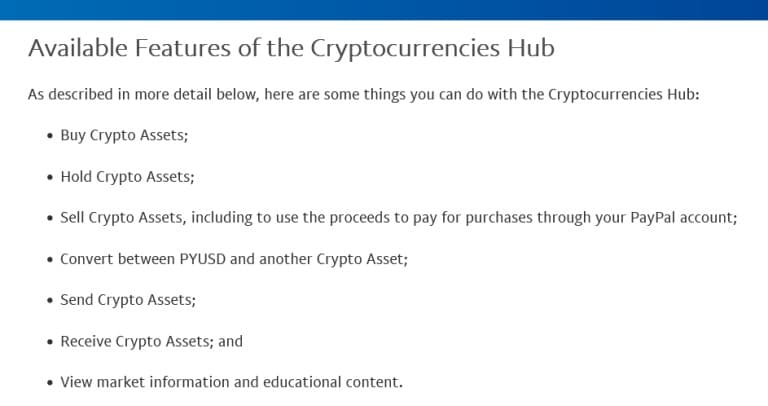In the midst of the bear market, giant PayPal is diving into the cryptocurrency sector. After announcing its own stablecoin dollar, PYUSD, the company has now confirmed that a “crypto hub” will be offered to users. What will it be used for?
A “crypto hub” at PayPal
The launch of a stablecoin at PayPal requires a change in the terms of use that apply to the services. And their update reveals that the company’s plans don’t stop at PYUSD. PayPal is set to transform itself into a platform for buying and selling cryptocurrencies for all its users. Its “crypto hub” will make it possible to acquire assets of this type, but also to exchange PYUSD for other cryptocurrencies :

As a reminder, PayPal’s US customers have already been able to buy and sell cryptocurrencies from the app since 2020, but this was a limited first initiative. PayPal’s “crypto hub” is therefore a continuation of the company’s initiatives, and looks more like a traditional cryptocurrency exchange platform.
It’s also important to note that PayPal doesn’t use the term “wallet” for nothing. The “hub” shows the amounts in cryptocurrencies held by PayPal on behalf of users… But users cannot interact directly with them :
“You will not hold the crypto assets themselves in your crypto balance. “
PayPal users will thus be able to manage their balances and make exchanges and purchases, but they will not have access to the wallets used.
Paxos as main partner for PayPal’s crypto services
Paxos is confirmed as PayPal’s main partner for cryptocurrencies:
“Certain custody, exchange and transfer services for crypto assets are supported on our behalf by Paxos Trust Company, LLC, or other service providers. “
Another limitation: the services are currently restricted to a fringe of users. To access PayPal’s crypto hub, you have to be a resident of the United States (except Hawaii), over 18 years old… And have a “valid” account. This means that the company will examine applications to decide whether or not to accept users for its new hub.
The fact remains that PayPal is undergoing a transformation that will bring it closer to a centralised exchange platform like Binance or Coinbase. The American giant is tackling a big market, but it has one advantage: the trust of users (and regulators).
However, as is often the case with PayPal, the user fees are particularly exorbitant. For small transactions (under 5 dollars), you will have to reckon with charges of between 5 and 45%. Will the company be able to attract enough users? As with PYUSD, the success or failure of its crypto hub will be closely watched.
